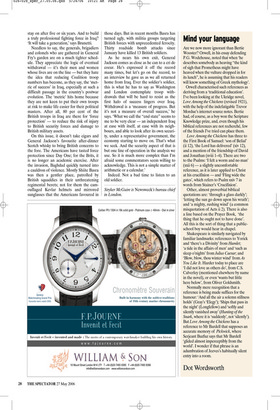Mind your language
Are we now more ignorant than Bertie Wooster? Orwell, in his essay defending P.G. Wodehouse, noted that when ‘he describes somebody as heaving “the kind of sigh that Prometheus might have heaved when the vulture dropped in for its lunch”, he is assuming that his readers will know something of Greek mythology’.
Orwell characterised such references as deriving from a ‘traditional education’. I’ve been looking at the Ukridge novel, Love Among the Chickens (revised 1921), with the help of the indefatigable Trevor Mordue’s internet source notes. Bertie had, of course, as a boy won the Scripture Knowledge prize, and, even though his biblical references are not recherché, few of the friends I’ve tried can place them.
Love Among the Chickens has three to the First Book of Samuel: ‘son of Belial’ (ii 12), ‘the Lord has delivered’ (xiv 12), and a mention of the friendship of David and Jonathan (xviii 1–4). There are two to the Psalms: ‘I felt a worm and no man’ (xxii 6) — a slightly uncomfortable reference, as it is later applied to Christ at his crucifixion — and ‘Fling wide the gates’, which refers to Psalm xxiv 7 in words from Stainer’s ‘Crucifixion’.
Other, almost proverbial biblical quotations are: ‘through a glass darkly’; ‘letting the sun go down upon his wrath’; and ‘a mighty, rushing wind’ (a common misquotation of Acts ii 2). There is also a line based on the Prayer Book, ‘the thing that he ought not to have done’. All this is the sort of thing that a publicschool boy would hear in chapel.
Shakespeare is similarly navigated by familiar landmarks: references to Yorick and ‘there’s a Divinity’ from Hamlet; ‘a tide in the affairs of men’ and ‘such as sleep o’nights’ from Julius Caesar; and ‘Blow, blow, thou winter wind’ from As You Like It. Harder today to place are ‘I did not love as others do’, from C.S. Calverley (mentioned elsewhere by name in the novel), or even ‘wants but little here below’, from Oliver Goldsmith.
Normally mere recognition that a reference is being made suffices for the humour: ‘And all the air a solemn stillness holds’ (Gray’s ‘Elegy’); ‘Ships that pass in the night’ (Longfellow) and ‘softly and silently vanished away’ (Hunting of the Snark, where it is ‘suddenly’, not ‘silently’). But Love Among the Chickens has a reference to Mr Bardell that supposes an accurate memory of Pickwick, where Serjeant Buzfuz says that Mr Bardell ‘glided almost imperceptibly from the world’. I wonder if that phrase is an adumbration of Jeeves’s habitually silent entry into a room.
Dot Wordsworth










































































































 Previous page
Previous page